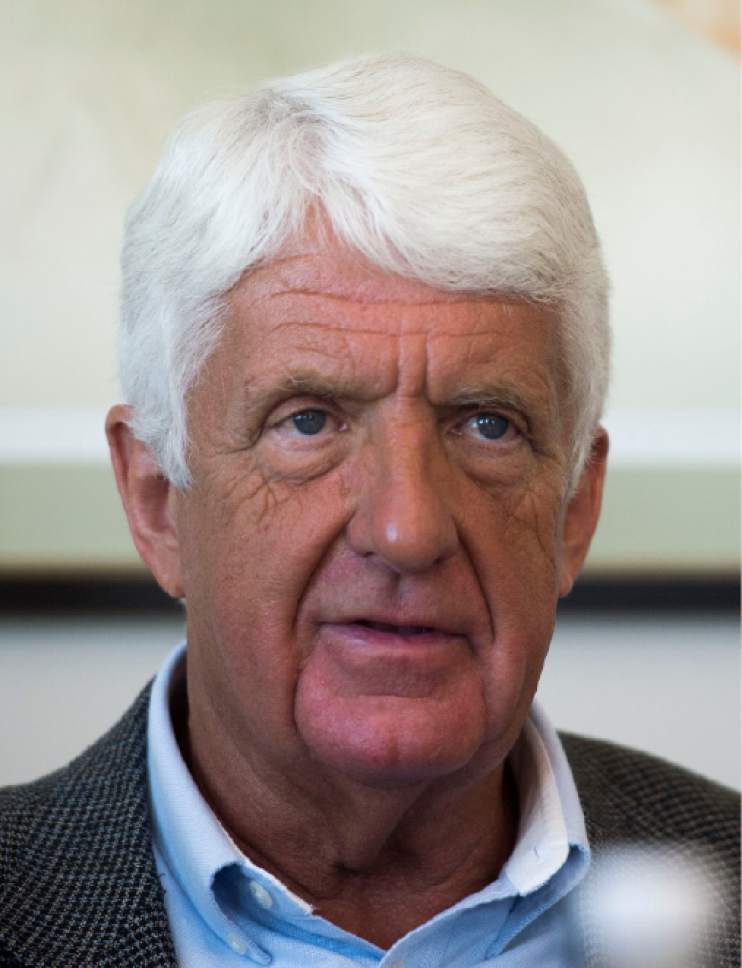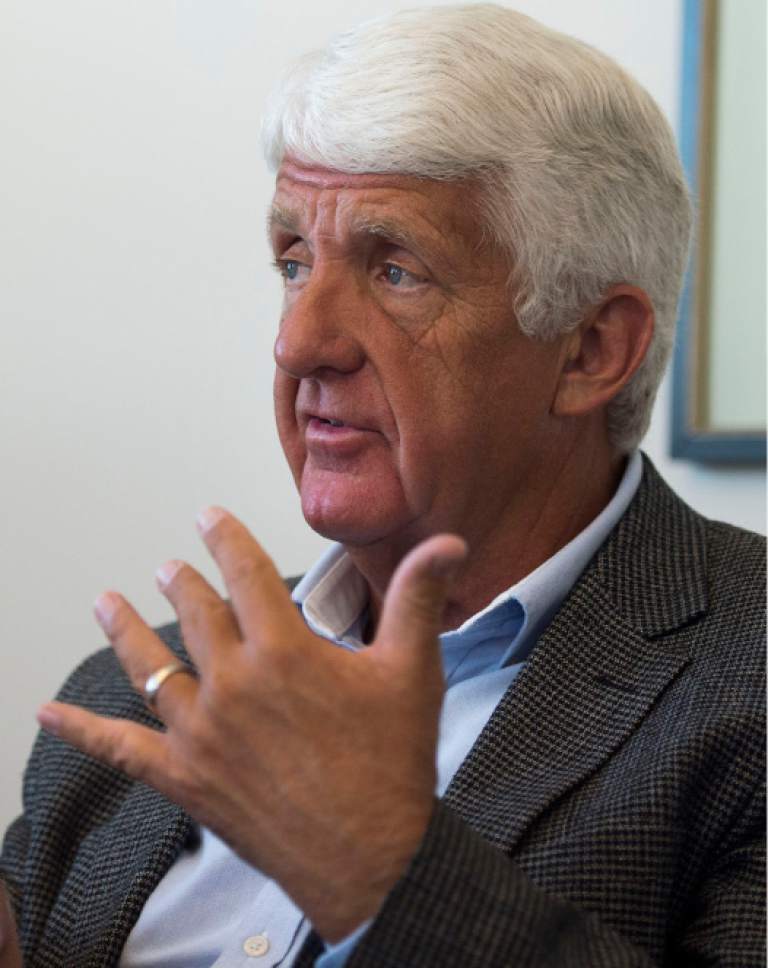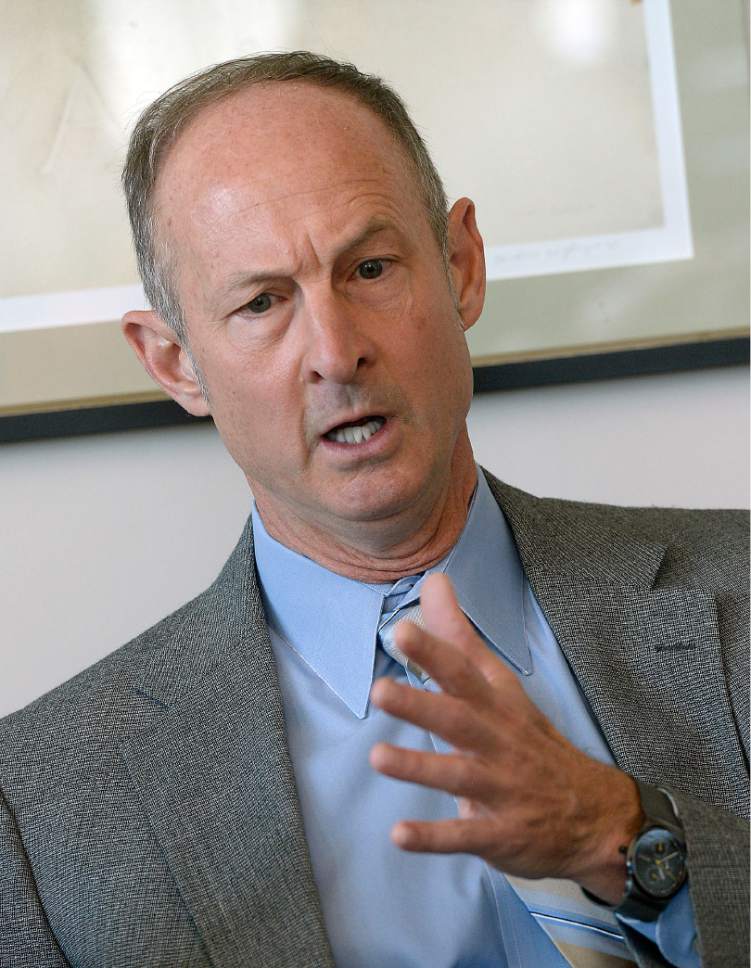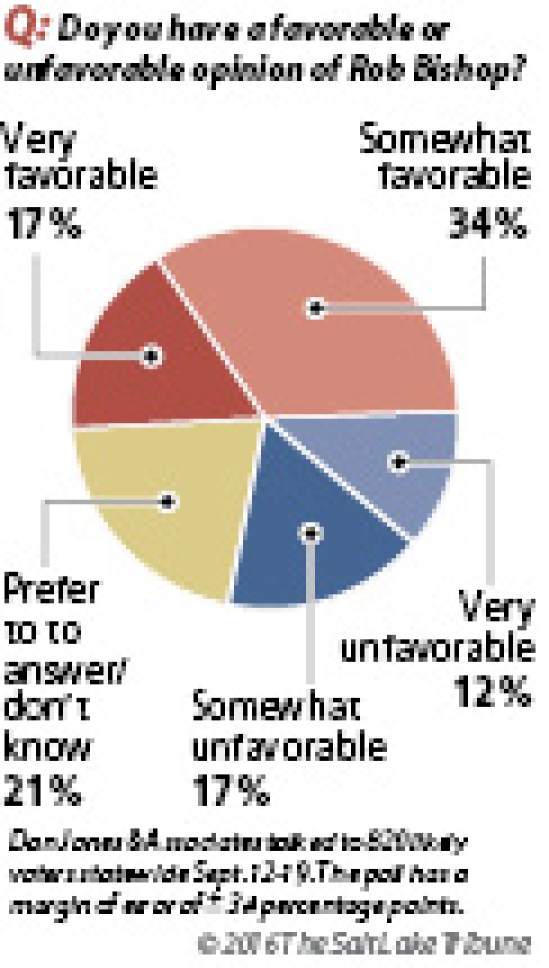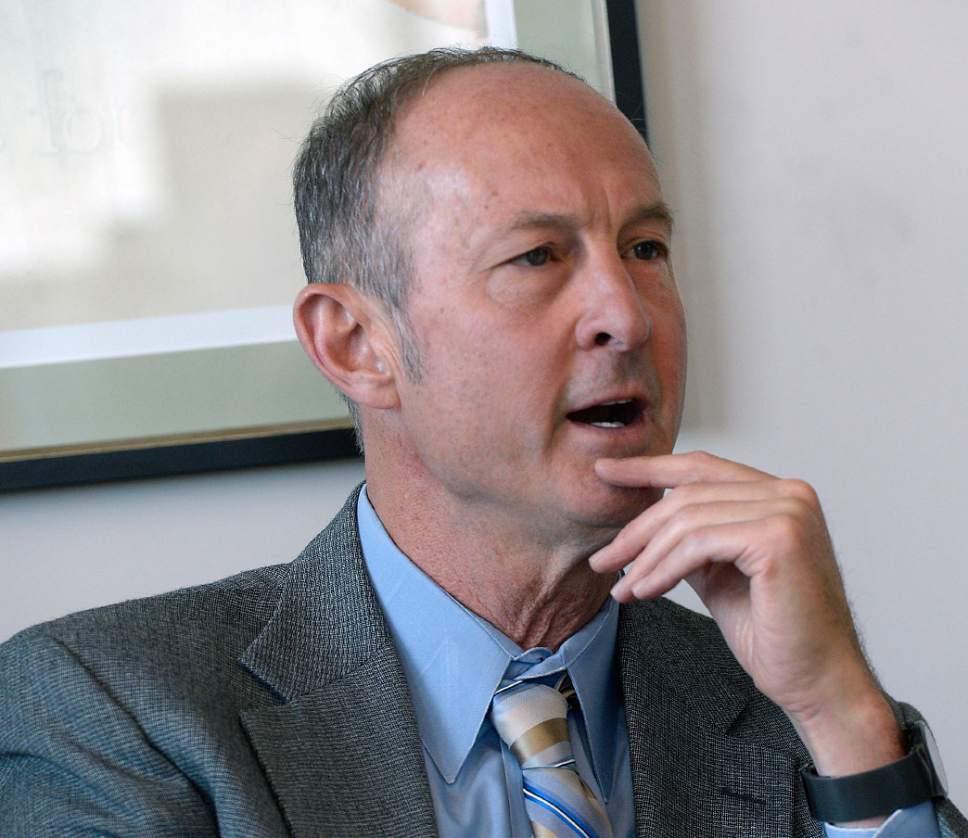This is an archived article that was published on sltrib.com in 2016, and information in the article may be outdated. It is provided only for personal research purposes and may not be reprinted.
Democrat Peter Clemens, an Ogden physician, says Washington politics are so unhealthy that they require a doctor in the House. But Rep. Rob Bishop, R-Utah, says politics are largely about power — and he has it, and can wield it to protect Utah.
"The only way to begin fixing our problems is to stop sending professional politicians to Washington," Clemens says. He adds that, as a doctor, for example, he can add a knowledgeable voice on how "to make health care affordable."
Meanwhile, Bishop says his chairmanship of the House Natural Resources Committee and service as a senior member of the Armed Services Committee give Utah clout.
"I have put myself in a position where I can assure that Utah at least has a voice" on important issues," he says. "We can guarantee that voice is heard, not just on public-lands issues, where I am chairman of the committee, but especially on military issues."
Bishop and Clemens assert they can best protect Hill Air Force Base (their district's largest employer), and take opposite stands on such things as how to protect public lands, reform immigration, alter gun laws and even whether climate change is real and how clean-air laws should respond to it.
Both served as young Mormon missionaries in Germany — and both were Republicans when they were young. But most similarities end there.
—
Peter Clemens • The son of a DuPont Chemical executive, he grew up in Pennsylvania, Texas and Delaware, and says his family was always active in politics — as Republicans. His mother, for example, was asked — but declined — to run for lieutenant governor in Delaware on the GOP ticket, he says.
Clemens once ran as a Republican for the City Council in Kansas City, Mo., while he was still in medical school there. "It was a largely Democratic district, and I lost a narrow election."
The self-described moderate says he switched parties because "the Republican Party left me. The Republican Party at one time was a place where moderate people existed." No more, he says.
He first came to Utah as a student at Brigham Young University. He joined the Army Reserves to help pay for medical school and rose to the rank of captain, serving as a medical doctor.
Clemens later returned to Utah as a physician. Besides operating a private practice, he also heads the Wound Care and Hyperbaric Medicine Center at Ogden Regional Medical Center.
He's never been cured of his bug for politics. As a Utah Democrat, he ran twice unsuccessfully for the Legislature and lost the Democratic primary two years ago in the same 1st Congressional District.
Why run again instead of focusing just on medicine? "I looked at the policies of Congressman Bishop and decided we could do better."
As he proclaims on his website, "We need to start sending real people [to Washington]; people who understand the realities of raising a family on a budget and caring for aging parents." He vows to serve no more than six years if elected.
—
Rob Bishop • Raised in Kaysville, he started his 28-year career teaching high school in Ogden, and later moved to Brigham City — where he lives in an early-1900s "Victorian eclectic" home, full of antiques connected to stories from his family history. Bishop says it shows his love for history.
He served 16 years in the Utah Legislature, including as House speaker and majority leader. He served two terms as chairman of the Utah Republican Party. In 2002, he was elected to Congress to fill the vacant seat of departing Rep. Jim Hansen.
He has served on the powerful House Rules Committee, which decides what is debated on the floor. He is a senior member of the Armed Services Committee and chairman of the House Natural Resources Committee.
He says he wants to serve four more years in Congress, when Republican rules would require him to step down from his chairmanship. He says his seniority and power mean "we can do some important things here" in those four years, especially with federal lands in Utah and protecting Hill Air Force Base.
He is a proud conservative and for several terms has used the campaign slogan that has double meaning: "Right on the issues. Right where we need him."
The smallest of any of his winning margins was when he was elected by 61 percent of voters in his first term.
A new Salt Lake Tribune-Hinckley Institute of Politics poll shows that voters have a favorable opinion of him by a 51 percent to 29 percent margin, with 21 percent undecided. The survey, conducted by Dan Jones & Associates, among 202 likely district voters from Sept. 12-19, has a margin of error of 6.89 percent.
—
Hill Air Force Base • Bishop says his influence and position on the Armed Services Committee helped bring the new F-35 fighter to Hill and helps provide continued funding for producing more F-35s.
"That is such a huge deal," he says. "That means the future of that base is more secure than ever. I'm not going to take total credit for that because I think the employees and their work ethic, as well as public support, are probably the driving factor."
In contrast, Clemens says, "The hardworking men and women at Hill are what keeps [the base] open. It's not Congressman Bishop."
In fact, he says, Bishop may be a problem. "It would be helpful to have someone who is not seen as a constant antagonist and foe of the federal government in that seat when those possible base closures come around."
Also, Clemens says, it would be helpful to have a congressman who served in the military, as he has, to help defend the base.
—
Public lands • Bishop is the sponsor of the Public Lands Initiative (PLI), which seeks to protect some federal lands in southern and eastern Utah and to open other swaths to development and mining.
The legislation, which tries to resolve perpetual disputes over some 18 million acres in seven counties, is praised by Utah's elected leaders but panned by environmentalists and American Indian tribes. It would create a national conservation area in the Bears Ears area of southeastern Utah as an alternative to a proposed national monument.
Clemens opposes the PLI and favors creating a Bears Ears monument.
Clemens says the PLI failed to listen to tribes about their lands. "Those sacred places are not being protected," he says. So, "I would support a national monument."
Bishop says he did listen to American Indians, and his bill would allow motorized access to lands they sought that a monument may block.
"There's a whole lot of it that I don't like," he says of his legislation, "but that's part of the compromise we went through."
Bishop also applauds moves by the Utah Legislature to spend up to $14 million to sue for control over federal lands in Utah, while Clemens opposes it.
"It's a bridge to nowhere," Clemens says. "There is no chance the federal government is going to turn those lands back over to Utah."
He also distrusts those pushing the lawsuit. "I believe that the interests of some of those people are to privatize that land. I think there would be decreased access for recreation, for backcountry use."
Clemens has also attacked the heavy donations that Bishop receives from oil and gas companies. He says in a video, "Dirty energy companies have undue influence over Rob Bishop and their enormous contributions to his campaign show that they want him to continue his pay-to-play support for their sweetheart deals."
Bishop believes Utah has a good chance of winning a public lands lawsuit, especially because the state has passed laws to show how it would responsibly manage the lands. He hopes it succeeds because "I have too many examples of where [federal] land managers have abused their authority and abused the land and hurt people in the process."
—
Health care • Both candidates want to reform the Affordable Care Act, or "Obamacare." But Clemens says that, as a doctor, he has expertise to help guide the effort.
"I have seen health care from the perspective of my patients," he says, "and as someone who delivers it."
He prefers a system that would be similar to Medicare. "I will tell you, as a physician, it is much more easy for me to interact with Medicare than it is with private insurance."
But he says Americans may end up with a system more like Germany, where a basic level of service is provided to everyone but people can opt to pay for higher levels. He says the difference in the percentage paid by Germans and Americans for health care "could pay for the defense budget."
Bishop says he wants to repeal the ACA. "It's designed to fail," he says. He would like reform "to put more private-market elements in the system."
—
Gun laws • Bishop sees no need to alter current gun laws. Clemens supports banning assault weapons and wants background checks extended to gun shows.
Changes that have been proposed for gun laws "are unworkable and wrong," says Bishop, a former gun-rights lobbyist. "None of the proposals so far would have had any impact on the violence that has taken place."
Clemens says he owns a gun and supports gun rights. But when it comes to semiautomatic assault rifles, "I don't see a place for those in American society. They are a battlefield weapon."
—
Climate change/air quality • Bishop says, "I believe there is climate change. I don't know the causality of it," and whether it is caused by mankind, or how much of it comes from burning fossil fuels.
"There is a cost of fossil fuels. There is also a benefit of fossil fuels," he says. "If there is any legislation that deals with that, they should take those elements into consideration."
In contrast, Clemens says, "Most people accept the fact that climate change is real, that climate change is largely being driven by the amount of carbon that we are putting in the air." He adds credible scientists worry that it could lead Park City not to have skiing by 2030.
"We need people on the federal level who will help change this process, not to continue to 'hear no evil, see no evil, speak no evil.' "
He also favors a "carbon tax" to help reduce use of fossil fuels. Bishop opposes it.
—
Immigration • Clemens favors a pathway to citizenship for undocumented immigrants, while Bishop says that is unwise for now.
"I'm not in favor of deporting 11 million people, so I think these people need a pathway to citizenship," Clemens says. "They are here because our economy needs them or they would go back to Mexico, as many of them have since 2008 and the economic downturn."
Bishop says what is needed first is to gain control of the border — not necessarily a wall, but allowing the Border Patrol to operate in wilderness areas that are now off-limits to motorized vehicles.
He said until that control is achieved, "The anger is so intense that [many Americans] are not willing to go any step further."
About the pathway to citizenship, Bishop says, "Hold off on that one. Do all the other stuff we can to reform the system first. Then it can happen. Maybe you will eventually get the goodwill you need to come up with that step."
—
Taxes • The candidates have different ideas on taxes.
Clemens believes education at state universities and colleges should be free through a bachelor's degree, a move he says "will pay for itself because we would have more young people contributing into the system in a greater way."
Clemens also favors raising taxes — if needed.
"We as a country are living in an era when taxes are at an all-time low. Yet we still have people who are wedded to the notion that we need to reduce taxes. I consider it an honor to pay taxes," he says. "But I want to pay a fair tax," and too many wealthy people now escape them. He wants their loopholes closed.
Bishop likes the idea of a flat tax in which all people pay the same percentage of their income in tax without deductions allowed — but says that is not likely to pass anytime soon.
Bishop also says pro-growth policies may bring in enough money "that you don't have to do significant cuts in spending." —
1st District candidates at a glance
Peter Clemens, Democrat:
• Ogden doctor, head of Wound Care and Hyberbaric Medicine Center at Ogden Regional Medical Center.
• Retired captain, U.S. Army Reserves.
• Unsuccessfully ran twice for Utah Legislature, once for Congress.
• Once was a Republican (and was a GOP candidate for city council in Kansas City). Says the party left him as a moderate.
• Married, six children, seven grandchildren.
• Campaign website: clemensforcongress.com
Rep. Rob Bishop, Republican:
• Has served 14 years in Congress.
• Chairman of the House Natural Resources Committee, senior member of Armed Services Committee.
• Served 16 years in Utah Legislature, including as House speaker. Former chairman of Utah Republican Party.
• Was a high school teacher for 28 years in Ogden and Brigham City.
• Married, 5 children.
• Campaign website: http://www.votebishop.com


